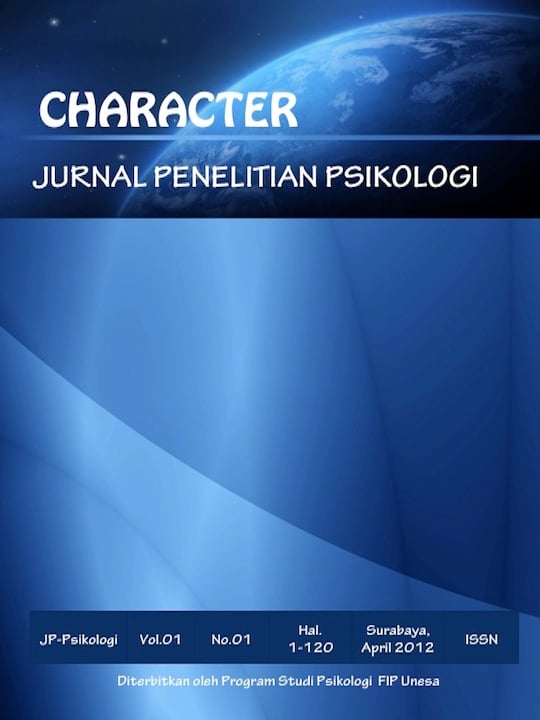HUBUNGAN ANTARA PERSEPSI DUKUNGAN ORGANISASI DENGAN KOMITMEN ORGANISASI GURU MADRASAH ALIYAH NEGERI (MAN) X
DOI:
https://doi.org/10.26740/cjpp.v9i6.47000Abstract
Abstrak
Keberhasilan dalam pencapaian tujuan instansi merupakan hal yang sangat penting. Guru merupakan SDM yang memiliki pengaruh besar pada instansi sekolah dalam proses pembelajaran dan pencapaian tujuan. Tidak dipungkiri guru harus memiliki komitmen yang tinggi dalam kinerjanya. Persepsi dukungan organisasi yang baik pada guru akan membentuk komitmen organisasi tinggi yang berdampak pada kualitas kinerja guru, sehingga tujuan dari penelitian ini adalah untuk mengetahui hubungan antara persepsi dukungan organisasi dengan komitmen organisasi pada guru Madrasah Aliyah Negeri (MAN) X. Subjek dalam penelitian ini yaitu 93 guru di MAN X dengan teknik pengambilan sampel jenuh. Pengambilan data dalam penelitian ini menggunakan Skala likert dengan instrumen persepsi dukungan organisasi dan komitmen organisasi. Teknik analisis data dalam penelitian ini menggunakan product moment correlation dengan bantuan SPSS 24.0 for windows. Hasil analisis menunjukan nilai koefiensi korelasi r sebesar 0,794 (r=0,794) dengan taraf signifikan sebesar 0,000 (p<0,05). Hasil tersebut menunjukan bahwa terdapat hubungan yang tergolong kuat antara persepsi dukungan organisasi dengan komitmen organisasi. Hasil yang positif menunjukan bahwa korelasi sejalan, maka apabila persepsi dukungan organisasi pada guru tinggi maka tinggi pula komitmen organisasi yang dimiliki guru, dan kebalikannya jika persepsi dukungan organisasi rendah maka komitmen organisasi yang dimiliki guru juga ikut rendah.
Kata kunci : Komitmen Organisasi, Persepsi Dukungan Organisasi, Guru
Abstract
Success in achieving agency goals is very important. Teachers are human resources who have a major influence on school institutions in the learning process and achieving goals. It is undeniable that teachers must have a high commitment in their performance. Perceptions of good organizational support for teachers will form high organizational commitment that has an impact on the quality of teacher performance, so the purpose of this study is to determine the relationship between perceived organizational support and organizational commitment to teachers at Madrasah Aliyah Negeri (MAN) X. The subjects in this study are 93 teachers of MAN X with saturated sampling technique. Data collection in this study used a Likert scale with instruments of perceived organizational support and organizational commitment. The data analysis technique in this study used product moment correlation with the help of SPSS 24.0 for windows. The results of the analysis showed that the value of the correlation coefficient r was 0.794 (r=0.794) with a significant level of 0.000 (p<0.05). These results indicate that there is a relatively strong relationship between perceived organizational support and organizational commitment. Positive results indicate that the correlation is in line, so if the perception of organizational support for teachers is high, the teacher's organizational commitment is also high, and vice versa if the perception of organizational support is low, the organizational commitment of teachers is also low.
Keywords : Organizational Commitment, Perceptions of Organizational Support, Teacher
Downloads
Downloads
Published
How to Cite
Issue
Section
License
Authors who publish in this journal agree to the following terms:
Copyright in any article is held by the author.
The author grants the journal, publication rights with the work simultaneously licensed under a Creative Commons Attribution License that allows others to share the work with an acknowledgment of the work's authorship and initial publication in this journal.
Authors may enter into separate, additional contractual arrangements for the non-exclusive distribution of the journal's published version of the work (e.g., posting it to an institutional repository or publishing it in a book), with an acknowledgment of its initial publication in this journal.
Authors are permitted and encouraged to post their work online (e.g., in an institutional repository or on their website) prior to and during the submission process, as this can lead to productive exchanges, as well as earlier and greater citation of published work.
 Abstract views: 592
,
Abstract views: 592
, PDF Downloads: 571
PDF Downloads: 571





